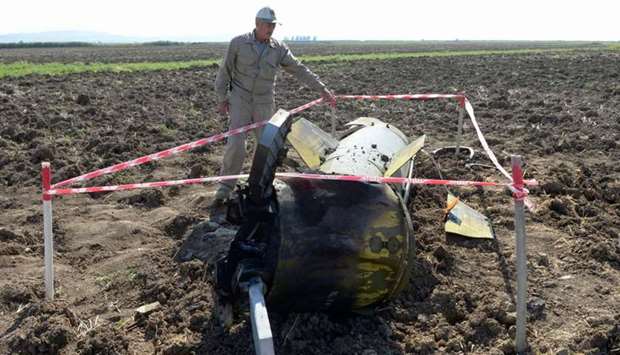Hopes that a Russian-brokered ceasefire between Armenia and Azerbaijan might hold were further eroded Sunday, with both sides accusing the other of intensive shelling of civilian areas and escalating two weeks of fierce clashes.
Azerbaijan's foreign ministry said that overnight shelling by Armenian forces on the country's second largest city, Ganja, had left at least seven people dead and 33 wounded including children, less than 24 hours after the halt to fighting was supposed to take effect.
Rescuers in red helmets dug through piles of debris with their bare hands in search of signs of survivors, an AFP journalist in the city reported.
They retrieved one nearly naked body and gingerly put it in a white bag to be taken away in an ambulance while several horrified residents watched on and wept.
One witness said they were woken by a huge blast that levelled an entire square block of one- and two-storey houses in the early hours of the morning, leaving nine apartments destroyed.
"Everything I've worked for my entire life has been destroyed," said resident Zagit Aliyev, 68.
The agreement to pause hostilities in order to exchange prisoners and the bodies of people killed after two weeks of fighting over the disputed Nagorno-Karabakh region was approved by Armenian and Azerbaijani foreign ministers in marathon Russia-brokered talks in Moscow.
The truce officially entered into force at noon on Saturday but both sides almost immediately accused each other of violations.
On Sunday, the defence ministry in the breakaway region insisted Armenian forces were respecting the humanitarian ceasefire and in turn accused Azerbaijan of shelling civilian-populated areas.
Claims that Armenian forces were responsible for shelling Ganja were "an absolute lie," it added.
The leader of the disputed Nagorno-Karabakh region, Arayik Harutyunyan, described the situation as "calmer" on Sunday, but warned that the truce was precarious.
An AFP journalist in the administrative capital of Stepanakert, which has been subjected to heavy bombing since the fighting erupted and is pockmarked with deep craters and unexploded ordnance, reported hearing loud explosions throughout the night.
Vahram Poghosyan, a spokesman for Karabakh's leader, said the overnight shelling of Stepanakert was "a disrespect of the agreements reached in Moscow," and called on the international community to recognise the Karabakh's independence as a way to end the hostilities.
New fighting broke out late last month, stemming from a long-simmering disagreement between Armenia and Azerbaijan over the region.
The disputed territory is an ethnic Armenian enclave inside Azerbaijan, home to about 150,000 people, which broke from Azerbaijan's control in a war in the 1990s that killed some 30,000 people.
Its separatist government is strongly backed by Armenia, which like Azerbaijan gained independence with the 1991 collapse of the Soviet Union.
International / Rest of the World
Heavy shelling and civilian casualties dash hopes for Karabakh ceasefire

A man stands by what is said is the remains of a Tochka U missile in a field in Fizuli district, Azerbaijan
